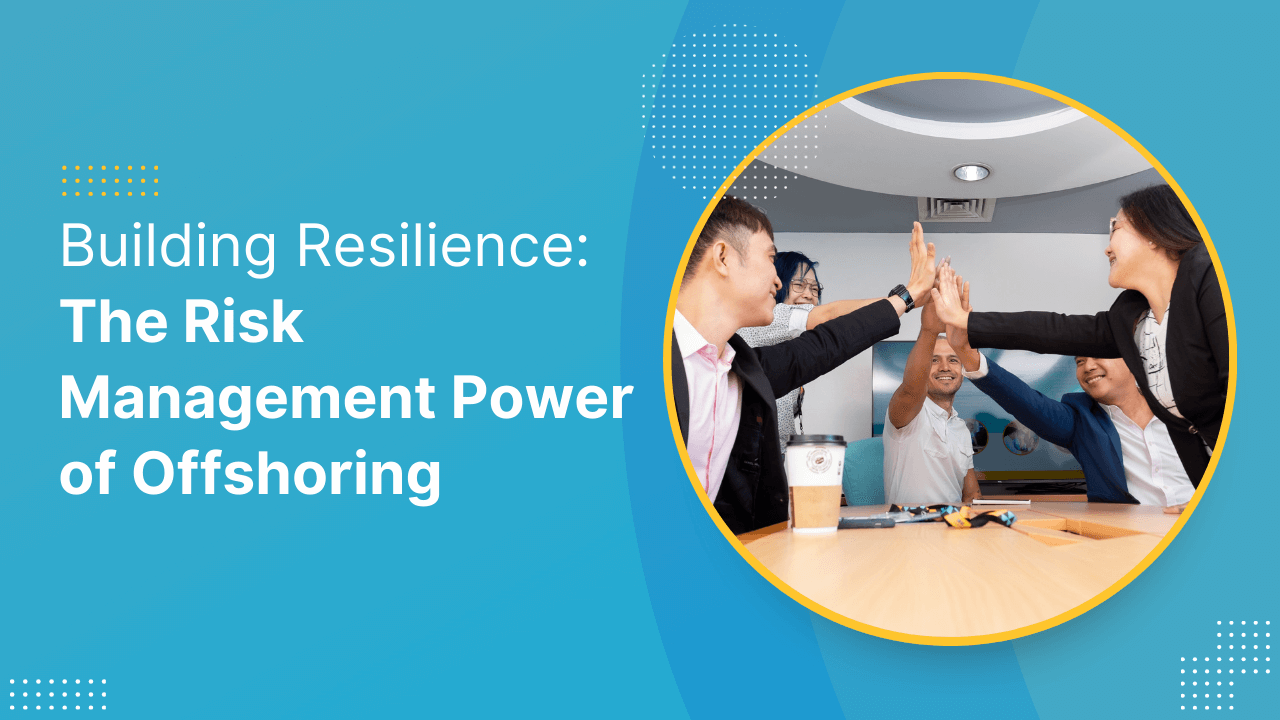Learn how offshoring can power your business into a growth engine. Get your FREE E-Book Today!
RESILIENCE:
Adapting to Adversity and Building a Roadmap for Wellness
November 12, 2020
WHAT IS RESILIENCE?
Resilience, as a psychological quality, is basically the capacity to recover quickly from difficulties. It stems from the Latin word resiliens, which means "to rebound, recoil."
Resilience helps us endure challenges and thrive despite curveballs that life eventually throws our way. American Psychological Association (APA) psychologists describe resilience as the ability to adapt well in the face of adversity, trauma, tragedy, serious threats and other sources of stress. These stressors include family and relationship problems, personal health, financial issues, and workplace stressors.
In times of crisis especially, psychological resilience means having the ability to mentally and emotionally cope well with a predicament — or at least the ability to return to normalcy quickly. This entails using cognitive and behavioural processes, utilising personal resources, and self-preservation by protecting oneself from the health risks and possible negative repercussions of such stressors, according to a publication by the Journal of Occupational and Organizational Psychology.
Being resilient doesn’t mean trauma or hardships won’t affect one’s health and wellbeing.
Life is full of challenges and stress, more so for people in economically hard-hit communities over the past months. Disappointments, setbacks, and adverse events are rather common. This often affects one’s psychological and physical health — giving credence to the thought that the road to resilience is likely paved with a lot of adversities and emotional stress.
IS RESILIENCE A DEFAULT TRAIT?
Some would say some people are definitely more resilient than others; although, being resilient isn’t necessarily unique to a finite number of individuals. Resilience as a personality trait essentially involves thoughts, behaviours, and actions that anyone can learn, develop and practice.
An example is the response of healthcare workers worldwide working round the clock since media outlets rang the alarm on the most recent global health crisis. In relation to a publication on Globalization and Health, the medical workforce treating and caring for COVID-19 patients face not only mental stress and physical exhaustion on a daily basis. Apart from risking infection, they frequently suffer exhaustion, isolation and separation from their families, psychologically demanding workplace dilemmas, stigma, and the pain of losing patients and their colleagues.
Last June 17th, the Washington Post has reported that many healthcare staff contracted the disease from workplace exposure and some have already died. This has been happening all over the globe. Yet medical health professionals all over the world continue to work day in day out, regardless of daunting infection risks and mental health challenges that come hand in hand with their sworn duties.
BUILDING AND CULTIVATING YOUR RESILIENCE
Interested in learning how to better adapt to stress and life-changing adversities?
Building one’s resilience involves maintaining optimism, focusing on priorities, and recognising when to let things go. Keeping up a positive outlook in the midst of a negative situation is valuable. Our strengths and positivity make us resilient as they help us cope well in times of distress.
We all have our own set of strengths and weaknesses. While some individuals maintain a calm temper in arguments and difficulties, some can be the total opposite. Some people are good at maths and logical thinking. Some are highly creative by nature. Some people are completely methodical in their approach, while some can be described as good listeners and highly empathetic.
HOW CAN ONE CULTIVATE RESILIENCE?
Mental health professionals would say it’s not all throughout an extremely difficult path to traverse. To be resilient, a person just needs to make a conscious effort to choose thoughts, actions, and behavioural process that help maintain a positive outlook.
Increasing psychological resilience requires time, effort, and determination — much like building your optimum physique. A study by Carbonell, D.M., Reinherz, H.Z., Giaconia, R.M. et al. emphasises four core components that can empower individuals to withstand and learn from difficult and traumatic experiences: connection, wellness, healthy thinking and meaning.
Curious about how to become more resilient when things get tough? Here are simple but useful tips to help you out.
TIPS FOR OVERCOMING STRESS AND MAINTAINING RESILIENCE
1. STAY OPTIMISTIC
It pays to be grateful and keep a positive attitude in life. We also need to be mindful of what factors or circumstances spark negativity in our thought process. If you feel like unloading some negativity, try a new hobby or activity to distract you from negative thoughts, ill feelings or a current dilemma. Learn a new skill. Reconnect with your family and friends. Hang out with people who keep a positive mindset. Maintain a grounded disposition and stay true to yourself. Also try to be objective at all times. Get straight to the facts first instead of immediately making assumptions about a certain person, event or situation.
2. CONTROL THE CONTROLLABLE
Life will be full of ups and downs. Take this into account as you try to keep control of a situation – or situations. Know which ones really matter. Anxiety is often triggered by the feeling of losing control over one’s life, choices, or emotions. If you’re experiencing bouts of anxiety, ask yourself: “Will it matter in five years?”
If the answer is no, it shouldn’t disturb your peace of mind today.
Resilient people have honed the ability to be aware of people’s behaviour and situations around them that may personally affect them at some point. Resilient people usually deal with anxiety and stress much better than others. They keep a cool head and control their reactions to the behaviour of people in their social circle. By being aware, you can keep control of a situation and come up with new ways to cope and solve problems.
3. FOCUS ON YOUR PRIORITIES
Keep in mind your most important goals and priorities. Prioritise tasks on a daily basis to avoid feeling overwhelmed. Focus your time, energy, and resources on the things that actually matter. Understand which situations or priorities require your attention the most, or help you achieve a major goal. When you are overwhelmed, it can leave you in a state of “analysis paralysis” – even with your best intentions and efforts, you end up finishing nothing of significance. When you forget to prioritise, sometimes you focus your time and energy on thinking too much, dwelling on the negative side of an issue, or doing something that doesn’t really make any significant changes.
4. STAY CONNECTED
Humans are social beings. We feel the need to connect to other people on a regular basis. In this respect, it’s essential to have empathy for people. Be kind to yourself and to others; keep in mind that they may be struggling with their own issues as well. Stay connected with those who truly matter in your life. Reconnect with nature – spend time outdoors, join an ocean clean-up drive, plant trees, adopt a pet, and be grateful even for the little things. To help keep up your mental and emotional health, catch up and spend time with people who inspire you, educate you, and help you maintain peace of mind and a positive outlook. Find and retain a support system that will encourage you to be the best version of yourself. Volunteer for outreach programs in your community. Research has proven that volunteering is associated with better physical and emotional health.
5. STAY FIT
Staying fit and healthy doesn’t merely mean being in tiptop shape. Your mental health basically determines your physical health. Aside from keeping up a great workout routine, practice mentally and emotionally stimulating activities regularly to avoid feeling like you’re in a period of stasis, especially if you stay indoors most days of the week. Read some good books. Watch entertaining and inspiring movies. Spend quality time with your family. Limit social media use. Avoid stressors such as updates on the pandemic casualties, statistics, recession-centred headlines, and other unpleasant news.
Get at least 6 to 8 hours of sleep every day. Eat organic as much as possible. Maintain a balanced diet most appropriate for your body type. Practice good hygiene. Try deep breathing. Meditate for 15 minutes a day. Bear in mind the 3 Cs: cool, calm, collected. Stay active. Avoid sitting or staying in bed for long hours. Do some stretching before, during, and after a hard day’s work.
RESILIENCE AS A ROADMAP FOR WELLNESS
At the end of the day, we all face upsetting changes, difficulties, and other stresses at some point in our life. Such adversities can be excruciatingly difficult to overcome, but keep in mind that they don’t have to determine the rest of your life.
Being resilient also means being appreciative. Each of us has a purpose in life. For most, it’s healthy and reassuring to live your everyday life aligned with that sense of purpose. Know and choose which aspects of your life you can control, change, and learn from.
All these help you build and cultivate resilience in the long run. Resilience can get us through difficult times by improving our wellbeing holistically, helping us become more productive members of society.
Recently added
Send us a message
AU
2/445 Warrigal Road, Moorabbin, VIC, 3189
PH
11F Felina Corporate Plaza, 5 Eastwood Ave,
Bagumbayan, Quezon City, 1100 Metro Manila
US
12100 Wilshire Boulevard, 8th Floor, Los Angeles, California 90025

Copyright Intogreat Solutions 2023 | Privacy Policy



